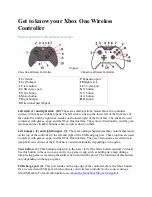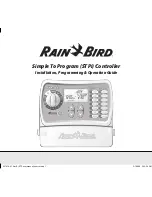
42
Troubleshooting
(cont)
Console Inputs
CONSOLE INPUTS
If there is no response from any of the following tests, refer to
the main wiring diagram on the pre vi ous page to locate the
next connector in line to ward the con sole and repeat the test
at that con nec tor. If there is a response at that connector, the
problem may be in the cable between the two connectors (or
the con nec tors themselves).
SPEED INPUT:
Turn rotary switch to speed po si tion and
dis con nect the speed sensor (yel low tie) from the main
harness. Check for 12 volts between pins B (white) and
C (black) of the main harness speed cable (yellow tie).
Using a clip lead or other jumper wire (such as a paper
clip bent in a “U”), several times rap id ly short to geth er
pins A (red) and C (black) of the 3-pin connector
(See
Illustration 44).
The console should respond with some
speed read ing.
FLOW INPUT:
Turn rotary switch to flow rate (not spray
rate) and disconnect the flow sen sor (green tie) from the
main harness. Check for 12 volts be tween pins B (white)
and C (black) of the main harness flow cable (green tie).
Using a clip lead or other jumper wire (pa per clip bent in
a “U”), several times rapidly short together pins A (red)
and C (black) of the 3-pin connector
(See Il lus tra tion 44).
The con sole should re spond with some flow rate reading.
REMOTE RUN/HOLD INPUT:
Disconnect the remote run/
hold sensor (or jumper cover) from the main harness.
Check for 12 volts between pins B (white) and C (black)
of the main harness remote run/hold cable (grey tie).
Placing a clip lead or other jumper wire (such as a paper
clip bent in a “U”) between pins A (red) and C (black) of
the main harness run/hold connector (grey tie) should
turn off the “HOLD” indicator on the console display.
Removing the jumper should turn on the “HOLD”
indicator on the console display.
FLOWMETER
Shaking the Flowmeter end to end should pro duce a “rattling”
sound (shaft end play). Blowing in the meter from either end
should spin the turbine freely. If the turbine spins freely but
the meter will not register flow with a known working sensor,
the turbine may be defective.
See Flow me ter Assembly and
clean ing on page 46 for details.
SERVO VALVE CONTROL SIGNAL
With the console turned ON, put the console in MANUAL
mode, place the remote Run/Hold switch in the RUN position
and turn all boom switches to ON. Using a voltmeter or
simple test light, check from a good frame ground to each of
the servo wires on the main harness connector. You should
get 0 volts on each wire. Holding the “+” button should
cause the RED wire to pulse toward 12 volts
(light will pulse).
Holding the “-” button should cause the BLACK wire to pulse
toward 12 volts (light will pulse).
SERVO VALVE
The best way to test the servo valve is with a known working
console. Turn console ON, put the console in MANUAL mode,
place the remote Run/Hold in the RUN position and turn all
the boom switches to ON. With the servo valve connected
to the servo valve lead on the main harness, holding the
“+” button should close the servo valve and holding the “-”
button should open the servo valve
(provided the console
has passed the Servo Valve Control Signal test).
The servo
valve should operate smoothly in both directions, from fully
open to fully closed.
You may also use a 9-volt transistor battery. Connecting the
battery to each terminal on the servo valve should cause the
servo valve to run in one direction. Reversing the battery
connections should cause the servo valve to run the other
direction. The servo valve should operate smoothly in both
directions, from fully open to fully closed. DO NOT connect
12 volts directly to the servo valve. Damage may result.
PLUMBING
Proper plumbing is a very important factor in obtaining
optimal performance from your MT-2400 system. The chart
below will help you determine what area of the plumbing
may be causing your problem. At this point, it is assumed
that your plumbing basically matches that of the system
diagram on page 26 and that the servo valve and flowmeter
are known to be installed correctly and functioning properly.
In addition, make certain that you have selected and installed
the correct spray tips for the application, speed and spray rate
that you intend to maintain. Don’t forget the obvious such as
leaky fittings and hoses, pinched hoses and plugged or worn
nozzles.
If you need more detail than the chart provides,
please refer to Plumbing Guidelines on page 44.
Three-Pin Connector
Illustration 44
C
B
A
Содержание MT-2400 LR
Страница 1: ...REFERENCE MANUAL AUTOMATIC RATE CONTROLLER MT 2400 TM LR...
Страница 46: ...Appendices 46...











































